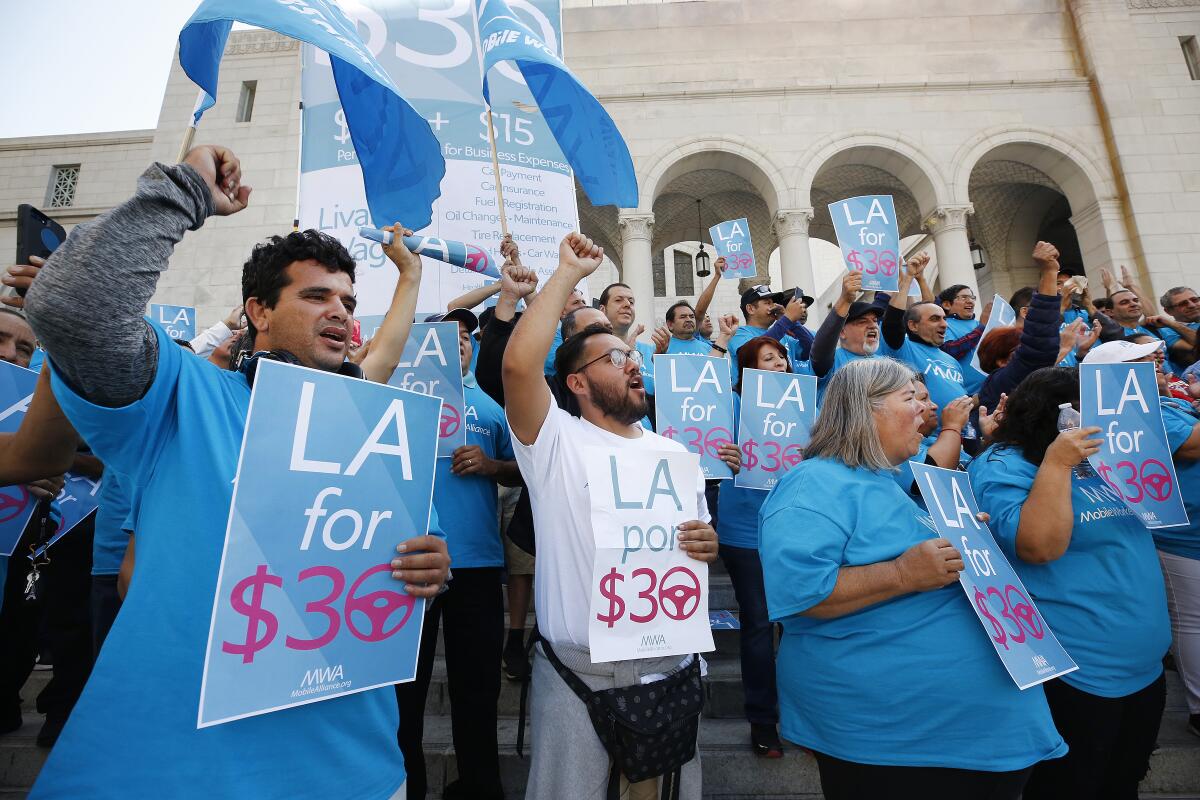Should Uber and Lyft drivers earn $30 per hour? Los Angeles will study a minimum wage

- Share via
Los Angeles lawmakers on Tuesday took the first step toward a minimum wage for tens of thousands of Uber and Lyft drivers, approving a study of how the law would work and how it would be enforced.
The City Council also requested an independent study of how much Uber and Lyft drivers earn in L.A., and how much they spend on gas, insurance and other operating costs.
The vote comes less than a week after City Council President Herb Wesson, who is running for a seat on the Los Angeles County Board of Supervisors, introduced a motion asking for a draft law to mandate a $15 hourly wage for drivers and $15 per hour to cover their expenses.
Lawmakers approved a softer version Tuesday, asking city analysts to study an hourly minimum wage, “with the goal of a $30 minimum.”
The vote comes a month after California Gov. Gavin Newsom signed Assembly Bill 5, an ambitious law aimed at curbing the use of independent contractors. Uber, Lyft and DoorDash are preparing a ballot initiative exempting themselves from the law.
More than a hundred Los Angeles drivers for Uber and Lyft, some in neon green and bright blue shirts, crowded into City Hall on Tuesday morning. A few held signs that read, “Regulate rideshare!” and “LA for $30,” with the zero replaced by a hot pink steering wheel.
Uber and Lyft are “never going to do right by drivers” if governments don’t force them to, said Eduardo Belalcazar, a driver and member of the Mobile Workers Alliance, organized by the Service Employees International Union Local 721. “We’re not asking for the moon. Just $15 to cover expenses, and $15 to take home.”
A 2018 study by a Washington think tank found that Uber drivers across the U.S. earned $11.77 per hour after vehicle expenses and the company’s cut from each ride. That wage dropped to $9.21 after the cost of Social Security, Medicare and “voluntary benefits,” such as healthcare and a retirement plan.
A letter from Uber and Lyft to Los Angeles lawmakers on a proposed $30 hourly minimum wage for drivers working in the city.
Both companies have disputed those findings.
Research from the Stanford Graduate School of Business this year found that drivers earned an average of $21.07 per hour between 2015 and 2017, before expenses and Uber’s commission fee. Three of the study’s five authors had been employed by Uber, and one left Uber to work at Lyft, according to the paper’s footnotes.
In a joint letter Tuesday, Uber and Lyft told Los Angeles lawmakers that they supported a “fair and impartial independent earnings study.”
But the letter, signed by policy managers from both companies, said it was “concerning” that the minimum wage motion was discussed and approved by the City Council on the same day, four working days after it was introduced.
Lyft supports a “guaranteed wage floor” and supports a statewide wage policy, spokeswoman Lauren Alexander said. Uber spokesman Davis White said the company supports “commitments on driver earnings” but is concerned that the study is “based on potentially false assumptions that will fundamentally bias its conclusions.”
Drivers on Tuesday said they are growing increasingly concerned that they cannot make ends meet, an anxiety driven by cuts to the per-mile rates that the companies pay the drivers. They cited Lyft’s new pricing structure in Arizona, which reduced some per-mile rates by nearly half.
“There’s a lot of fear that could happen here too,” said Jon Davidson, 57 of Alhambra, who drives for Lyft part time. “You’re basically just driving to pay for gas and taxes.”
Davidson began driving for Lyft two years ago, after he retrained as a paralegal and could not find full-time work. He works part time as a clerk at a law firm, where he earns minimum wage, and drives part time. He has a bad back, and hates driving in Los Angeles traffic, he said, but it’s the only way he can make ends meet.
He added: “Like so many people, I never thought I’d be in this situation.”
More to Read
Sign up for Essential California
The most important California stories and recommendations in your inbox every morning.
You may occasionally receive promotional content from the Los Angeles Times.









